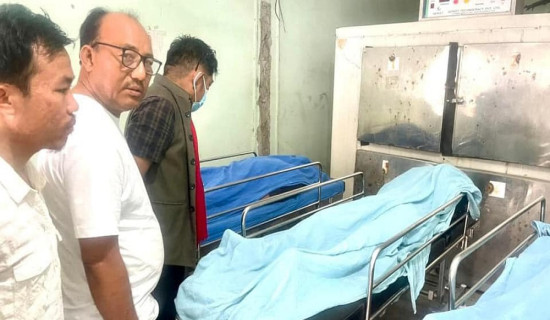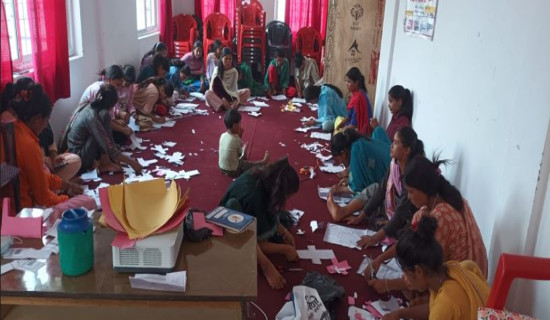- Wednesday, 24 April 2024
Ensure Affordable Health Services
Yug Bahadur
We all know that the nation is right now going through a complicated political process in many aspects and at the same time efforts too are being made to ensure stability so that other equally serious matters can also be looked after. There are many twists and turns, yet the majority of the people are hoping and are also confident that these problems will be settled through understanding by the parties and things will eventually smoothen out.
But more than politics, we are today concentrating on the frail health system in the country which is really a traumatic situation for most people, especially those who live in remote areas and those who cannot pay the huge expenses required for even normal health care.
Even in the cities and other urban areas, health facilities is either hard to get or just too expensive and beyond the reach of the general public. It is even difficult to get the right physicians who can look well after a person’s illness and where such a doctor can be found.
Medical manual
One person has come up with an idea to bring out a manual, which explains the functioning of every medical personal and maintain their names, expertise and in which hospital they can be found. Just looking for doctors and other medical hands and going to seek help will be like ‘whistling in the wind’. So such a manual would be handy, just like a telephone book to know the phone number of a person and in this case a competent doctor to look after your ills. But if you fall in wrong hands, yes, your problems will be looked into, but not much else can be done, so it will be not only waste of precious time for any patient, but also loss of money and in the end no cure.
Not that the government has done nothing to improve the situation. In spite of the fact that the oldest hospitals belong to the government, they are in a shambles though they have good human resources and back-up equipment. First of all, let us start with the regulation implemented by the government that all freshly trained doctors must serve for at least one year in some remote parts or villages of the country. Then there are hospitals in every province and district and smaller health providing facilities, like health posts for instance can be found almost everywhere. But sadly, there is no manpower to run such institutions in an effective manner.
Better perks are given along with living quarters, better opportunities for promotion and better chances to go abroad for further training are also dangled in front, not such gestures work, as our skilled medical manpower want to stay on in the city areas, where they feel more comfortable and where they can also expect more income. It would be foolish here to give any off-hand solution on such a serious matter. But what could be done is a high level committee be formed, filled not just by politicians or their supporters, but with highly qualified and experienced medical hands and maybe a few administrators who have worked for a long period of time among others, and then they come up with a really pragmatic solution which the government could implement.
This would not only benefit hundreds of thousands of people in the long run, but it would also prove the general masses the government is really doing some work for the welfare of the nation. Most of the times we have seen policy-makers indulging in short term solutions, for example filling potholes on the roads but not being very serious why roads are being damaged so early, not only bringing wear and tear faster for vehicles but also making the roads dangerous. It is the same with trying to enforce the compulsory wearing of helmet by pillion riders on two wheelers, yes these are good gestures but how many lives it save compared to having a solid medical channel through which each and every Nepali can pass through and get their ailments cured.
This is a thought which policy-makers must mull over seriously. After all, even the constitution has said that good health is a fundamental right of the people. Now come to the part of private hospitals. Once, an eminent industrialist told this author how he would make a ‘world class’ hospital here in Kathmandu so that people would not have to go abroad and face hassles like visa procedures, language barrier as well as spend big time money. It seems both his father and mother were sick at that time. This man kept his promise and built a reputed hospital where even very serious cases are treated.
Expensive hospitals
Both ‘international class’ and other medium yet good hospitals have mushroomed specially in Kathmandu. The problem is they are unaffordable for the majority of the people. One can say in a single breath the names of more than a dozen top level hospitals, which boasts of having top level medical hands and they also say they have all the necessary backup equipment needed for all times, including having helicopter services in emergency cases. This may all sound fine but there are differing views on what sort of services are provided.
But leaving aside the good or mediocre services they give patients, the most distressing thing is, these hospitals are just too expensive. Yes, we also need the ‘high-tech’ hospitals, but what we need more is the ‘slipper’ wearing medical hands with enough medicine roaming in the remote areas where health facilities are really needed. Just the mortality rate of people in far-flung villages with simple ailments compared to similar mortality in the city areas should be a strong indicator where the focus of the health authorities must be there. The nation will not be strong in any aspect if the people are not strong and the people will be strong only with good health.
(Yug Bahadur is a freelancer.)















